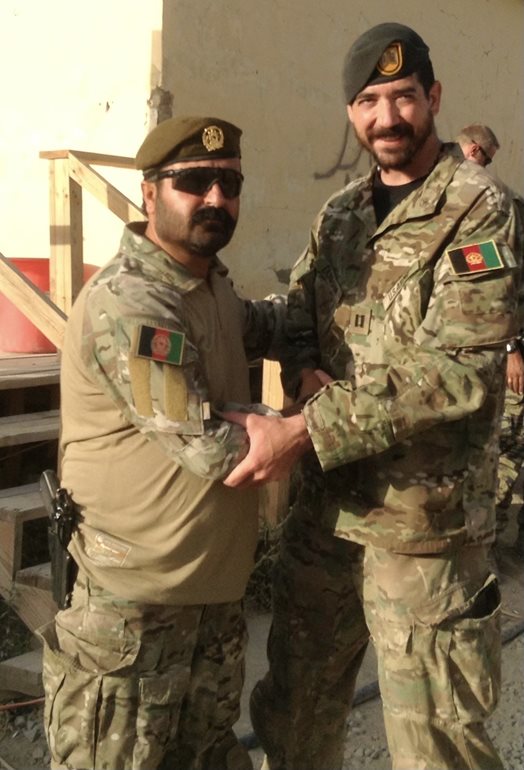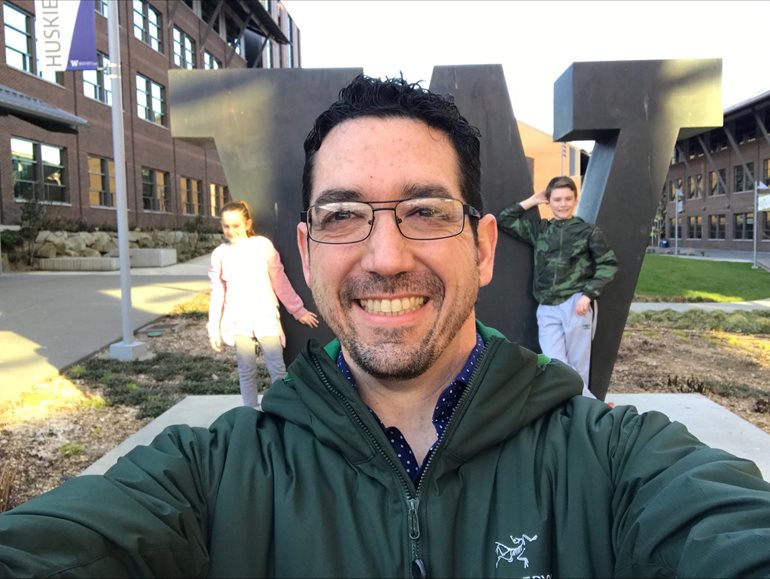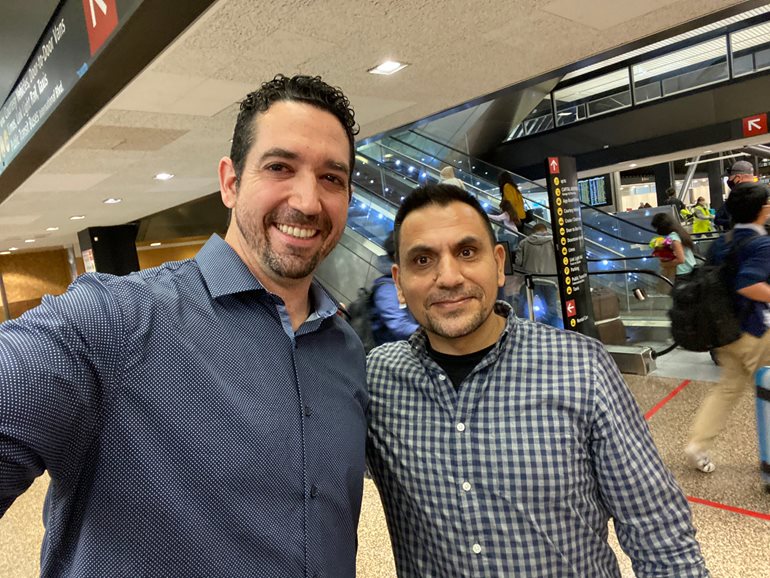By Christian Dunham
I served in the U.S. Army beginning in 2006 and joined the Special Forces, also known as the Green Berets, in 2009. I led a 12-person Special Forces Operational Detachment – Alpha in Afghanistan to work by, with and through local Indigenous people in permissive and non-permissive environments conducting covert operations.
This is my story. But in order to tell you my story, I need to also tell you the story of my two heroes named Azizullah.

I met Azizullah Karwan in 2013. At the time, he was serving in a covert guerrilla army, and my job was to transition him to become a legitimate member of the Afghan government. In all, my team recruited, vetted and trained a 1,200-personnel army with cross-border capabilities that was non-attributable to the U.S. government.
Because of his work leading dozens of anti-Taliban operations, Aziz was often a target for assassination. On Sept. 13, 2013, a 3,000 lb. suicide bomb in the form of an Afghan jingle truck destined for Aziz went off about 90 meters from the safe house where my troops and I were staying. On that day, we were vulnerable to being killed by the Taliban army. At great personal risk, Aziz came to our rescue. For the next month, his troops split their naan bread and other rations with me and my team. They saved our lives.

I suffered a traumatic brain injury as a result of the suicide bomb, and my military career ended in 2015. I returned to the states, became a security expert at Target, started a family and now am pursuing my Master of Science in Cybersecurity Engineering at the University of Washington Bothell. All because my hero Aziz saved my life.
I have felt huge guilt that I couldn’t return the favor. After multiple attempts at his life, in 2018 Aziz K. was killed while he was on a picnic with his family.
As the U.S. withdrew from Afghanistan this past summer, I couldn’t help but reach out to my old Special Forces contacts. This led to my being pulled into Task Force Pineapple by a fellow Green Beret who attended both the Special Forces Qualification Course and the Ranger School with me. Task Force Pineapple is an underground railroad of sorts, a volunteer group of U.S. veterans working to evacuate American citizens and Afghan allies and their families.
I began as a shepherd with “flocks” of Afghans I bring to secure locations, helping them move from one safe house to another through our clandestine network. When I should have been working on my thesis, “Federated learning anomaly detection for the Internet of Things,” I was instead contacting Afghans at risk, teaching them how to get through Taliban checkpoints and find supplies to survive, and coordinating doctor visits for pregnant women and sick children.
This has been a digital offensive like no other in history. Now that the Taliban owns the network in Afghanistan, it can monitor all traffic sent in plain text, putting both sender and recipient in harm’s way. My training in cybersecurity has been instrumental in keeping people alive. I have been able to steer flocks away from vulnerable communication platforms that are being used to spoof them with messages from numbers that appear to be from their shepherd but in actuality are from the enemy instructing them to go to locations where they are then captured.
With my background, I quickly moved from being a shepherd to a chief conductor, overseeing 10 conductors who manage 150 shepherds supporting 5,000 Afghans. Additionally, I am personally shepherding about 75 Afghans.

Among them is the family of Azizullah Jabarkhail, a fellow Husky studying political science in Seattle.
In the process of vetting Aziz J., we discovered that we fought together in the Battle for Ghazni. On Aug. 28, 2013, hundreds of Taliban soldiers launched a complex attack on Forward Operating Base Ghazni, a Polish base that housed my company headquarters. For hours, I was pinned in place by a concrete barrier. Five Taliban fighters on a hotel rooftop 1,000 feet away fired a DShK machine gun in my direction, with more rocket-propelled grenades than I could ever count. I remember the concussive blasts of the RPGs hitting the concrete behind me, eventually rocking my body into a sense of peace like being in the ocean.
Aziz J. happened to be at FOB Ghazni as a linguist when the fighting broke out. He quickly joined forces as they assimilated and fought back against the invasion. We didn’t know each other, but we were on the same side, separated by a concrete barrier.
On the eighth anniversary of my “Alive Day” when Aziz K. saved my life, on Sept. 13, 2021, I met Aziz J., and we have been side-by-side ever since.
In May 2020, while it was still relatively safe to travel to Afghanistan, Aziz’s wife and U.S.-born children — Hakmat (12), Adil (10) and Lima (8) — went to visit their family. Chaos and catastrophe soon ensued.
His children were unable to play outside. They had to stay hidden, fearful due to their father’s known involvement supporting U.S. troops. Their blue passports and the fact they were American citizens made them high risk targets for the Taliban.
After vetting Aziz, I told him, “We are family. I am going to bring your kids home.” It was the beginning of paying forward the greatest sacrifice Aziz K. had made for me.
It took nearly a month. I worked with Aziz’s family to prepare them for safe transport. I will never forget calling Hakmat, who has grown up in relative comfort in the states, and telling him in the middle of the night that he had 45 minutes to get one bag for each of his family members and meet up with someone at a secret location in Kabul. And he did it.
Hakmat faced Taliban checkpoints and led his family members to safety. Through encrypted messages, Aziz and I got them through the Taliban-controlled gates at Kabul International Airport where they were then stuck for three days as we negotiated with both the Taliban and U.S. Department of State to get them out. As news media reported, there was pandemonium, and many families in similar situations left the airport. Aziz helped me keep his family calm, and they made it on the plane to Abu Dhabi.
As an aside, I truly have no idea how Aziz was able to keep it together while his family was in such danger. Through the heartaches and fears as his family tried to get past checkpoints and the times they were turned back, he managed to stay level-headed and keep up with his studies and his job as a driver for a ride-share company.
Once in Abu Dhabi, his wife (who I am not naming out of concern for her family back home) and children faced another hurdle: The Department of State denied their clearance to the states, despite all our preparations. They even provided negative COVID-19 tests and received measles vaccines so they could get on the plane.

I reached out to the office of U.S. Congressman Adam Smith, and his staffers helped us get the embassy to validate their passports. They made it to Chicago, where we put them up in a hotel nicer than their apartment in Kent, Washington. After some grassroots fundraising, I had enough money to buy their tickets to bring them home to their dad, my hero Aziz, on Oct. 1, 2021.
This Veterans Day, I will honor not only my grandfather — a veteran before me — and my SFOD-A comrades but also my heroes Azizullah Karman and Azizullah Jabarkhail.
Christian Dunham expects to graduate with his master’s in Cybersecurity Engineering in June 2022. Since helping Aziz’s family to return, he has brought two additional Afghan families to safety in Kent, with one more waiting for a flight out of Kabul Airport as of this writing. Learn more about Task Force Pineapple.



